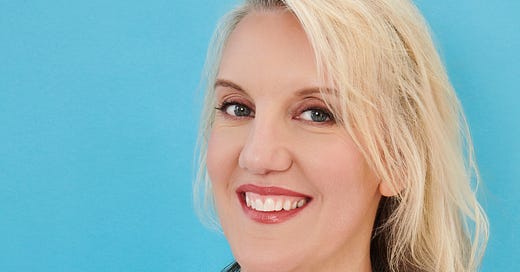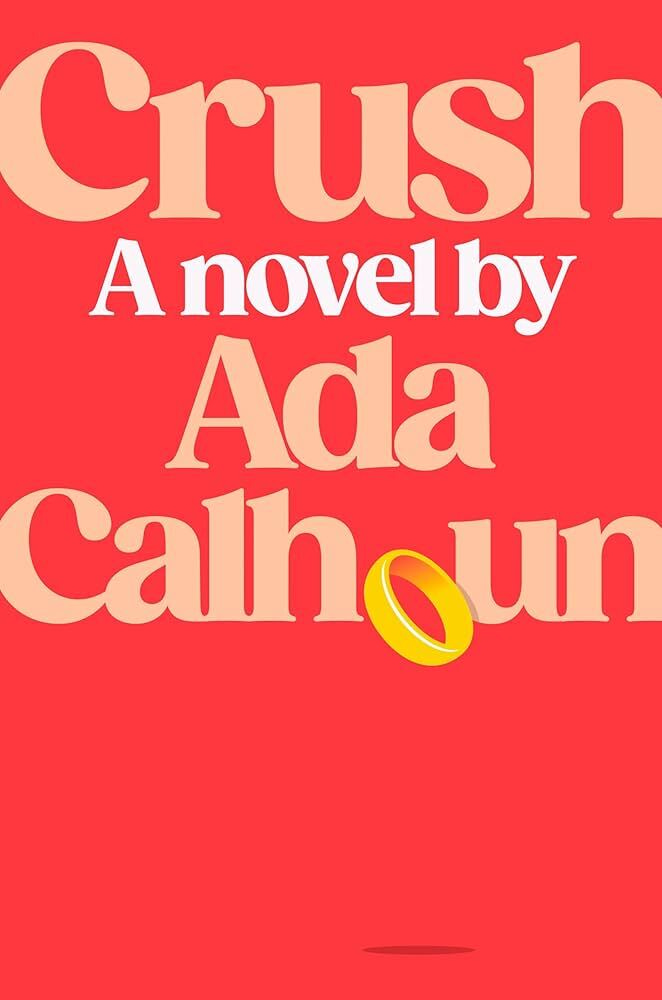23 Burning Q's with Author Ada Calhoun
Her bright new novel, 'Crush,' asks some big, important existential questions about love, happiness, and personal fulfillment, both in and out of marriage.
Photo: Jena Cumbo
My pal Ada Calhoun is a real lover of words, dive bars, old buildings, Law and Order SVU, library smell, poker, her close friends, and all children (people hand her babies)—she’s the kind of friend capable of inspiring and comforting you in the same breath. As a prolific writer of books (both credited and uncredited to her), she has the unique ability to hone in on the unspoken emotional corollaries of the human experience.
When I say prolific, I’m not FCKNG with you: Her first book, Saint Mark’s is Dead: The Many Lives of America’s Hippest Street, enshrined the historic East Village block where she grew up with an oral history of its inhabitants; scores of Gen X women nodded along while reading Why We Can’t Sleep, an honest examination of the female midlife crisis; Wedding Toasts I’ll Never Give was her personal, unflinching look at the toils of marriage; and her last memoir, Also A Poet, was a critically acclaimed, best-selling examination of her complex relationship with her late father, the writer Peter Schjeldahl.
We’re lucky MUTHR, FCKRS today because Ada very generously joined me for a long, lovely chat (a
exclusive!) about what went into writing Crush—her latest, highly anticipated novel (from the likes of TODAY, New Yorker, Washington Post, New York Times, TIME, Harper's Bazaar, Town & Country, Bustle, Lit Hub, Zibby Owens, Marie Claire, AARP, Bloomberg, The Millions, The Seattle Times and Vulture) about what happens when you work so hard to “have it all” but your husband asks to redefine your marriage—and all hell breaks loose. A total joy to read, Crush invites us to consider our own, evolving wants and needs within the context of the commitments we make.To get hip, snag yourself a signed copy from Books Are Magic, or if you’re in the NYC area I’ll do you one better—go see her chat with Taffy Brodesser-Aker (Fleishman Is In Trouble; Long Island Compromise) on Wednesday, February 26th at 7:00.
Read on for the burning Qs! Ada and I get deep. We get philosophical. We get into craft and story structure. We get into life. Get into it.
MUTHR, FCKD: I know that Crush was seeded in a memoir, but evolved into a novel. What was that process like?
ADA CALHOUN: Much of the voice is the same as I would use in a memoir. The experience of being a woman in this generation, doing a lot of caregiving, trying really hard to please and be good, and being a teacher’s pet is very close to my own experience.
MF: How did Crush come about?
AC: I had a crazy few years. I was doing a lot of caregiving and a lot was going on in this stage of life and I thought, “I will write a memoir about this!” I tried and was just very messy. As in life, there was not a clear arc, the characters were complicated, there were too many of them, and it wasn’t holding together. So I wound up abandoning that and trying to make a novel covering the same kind of thoughts and ideas I was having, especially the experiences and ideas that came out of doing Why We Can’t Sleep: What is it to be a woman in the world? What do you do with desire? How are you faithful to yourself and to other people? What are we here for? I think I had all these philosophical questions that were not being served by my actual experience and realized they would be if I was able to make some stuff up and create a nice arc where there wasn’t one in nature.
MF: Am I on crack or does your protagonist remain nameless?
AC: Yes! Nameless and also placeless! Which I thought made it kind of like a fairytale—they could be anywhere. So many people were like, ‘a Brooklyn writer…’ and I’m like…OK!
MF: Saint Mark’s is Dead, hello!
AC: Yes, I’m definitely Manhattan, but also it was very funny to me that they were like, this is a woman reckoning with marriage so this character must live in Brooklyn! I think it’s a little bit hilarious.
MF: Doesn’t someone who wrote a recent book about polyamory live in Brooklyn? Maybe they’re inferencing?
AC: There’s a lot of Brooklyn. I totally get it. I was really happy Emma Straub wrote this thing about my book in her newsletter recently saying, ‘Guys, yes there are a lot of divorce novels, this is not like those. This is different! This is fun!’ I thought that was really nice.
MF: It’s delicious because it’s a love story but as much as it is a love story in the traditional sense, it’s the protagonist’s love story with herself. She learns to love herself through the process of caretaking for her father, and her kid, and reckoning with her marriage. It does spur a lot of internal discussion, especially among those in long-term relationships. Both parties might grow but don’t always grow together or in the same way—I feel like that struggle isn’t discussed enough. Can you talk to me a little bit about the deep, intense, spiritual connection that forms between David (the crush in question) and the protagonist? Why was the spiritual aspect of connection important to include in the narrative?
AC: I think, in general, getting a crush is often information about something that we’re craving, something we need or want. I think the character gets this crush on somebody who is so pure, serious, focused, and intellectual in this way that she hasn’t encountered in a while. She realized wait a minute, this is how I am, this is what I like, and I’ve been ignoring that side of myself for so long. Then she’s able to have this experience of reconnecting with this more spiritual, higher plane version of who she is, sort of realizes she’s been putting up with all this other stuff in the meantime, and suddenly is like, why am I doing all that?
MF: Their intellectual connection and book nerdiness are so sexy!
AC: Book nerdiness is sexy…I’m glad that happened!
MF: In many ways, it hearkened back to sort of a Pride and Prejudice vibe or this Victorian sensibility of writing each other love letters and having to court each other cerebrally, not just sexually. By taking the sex out of it, it became incredibly sexy!
AC: I haven’t heard Pride and Prejudice yet! I love that book. It’s my mother’s favorite book and she reads it every year. I’ve always loved it. The Colin Firth BBC Pride and Prejudice is one of the more pornographic shows in the history of the world (laughs)! There’s something so hot about the restraint that makes it so charged.
MF: It’s refreshing in this day and age of being able to order sex to your doorstep to have this chance connection, that leads to an intellectual spark, that leads to this beautifully restrained but powerful courtship.
AC: It’s the restraint and the connection that gets you there!
MF: As a reader of your non-fiction works, I’ve always admired how deftly you weave your own considerations and thoughts into the research you share. Was your approach to weaving in the research about spiritual connection any different in working with a fictionalized text? How do you serve this kind of info with sugar?
AC: I don’t know how else to do books. You just throw everything in them that might be helpful or interesting to the story, so I think it was the same approach. Anytime
Keep reading with a 7-day free trial
Subscribe to MUTHR, FCKD to keep reading this post and get 7 days of free access to the full post archives.




